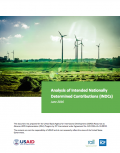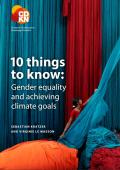Although evidence shows that women are both victims of climate change and important contributors of knowledge and skills in disaster risk, adaptation and mitigation strategies, the gender perspective is largely missing from the design and planning of climate change responses and policies. In addition, most research into gender and climate change has been exclusively conducted in rural contexts. There is strong scope for filling these knowledge gaps to improve the understanding of the relationship between gender and climate change in urban settings.
This policy brief explores the advantages and challenges of integrating a gender dimension into climate compatible development strategies in urban settings, with a focus on the Asian Cities Climate Change Resilience Network (ACCCRN) project in India. An initiative funded by The Rockefeller Foundation, the project was implemented in Gorakhpur, Uttar Pradesh by the Gorakhpur Environmental Action Group (GEAG).

This white paper provides an analysis of the Intended Nationally Determined Contributions (INDCs) for 37 partner countries in the U.S. Government's Enhancing Capacity for Low Emission Development Strategies (EC-LEDS) program and other designated priority countries. The white paper includes an overview of global INDCs, country profiles for countries, regional trends, and sectoral trends. Moreover, each country profile includes information from the INDC on the:
Laboratory studies suggest that improved cooking stoves can reduce indoor air pollution, improve health, and decrease greenhouse gas emissions in developing countries. The authors provide evidence, from a large-scale randomized trial in India, on the benefits of a common, laboratory-validated stove with a four-year follow-up. While smoke inhalation initially falls, this effect disappears by year two. They find no changes across health outcomes or greenhouse gas emissions. Households used the stoves irregularly and inappropriately, failed to maintain them, and usage declined over time. This study underscores the need to test environmental technologies in real-world settings where behavior may undermine potential impacts.
The policy summary for this paper is available here.
Biomass combustion with traditional cookstoves causes substantial environmental and health harm. Nontraditional cookstove technologies can be efficacious in reducing this adverse impact, but they are adopted and used at puzzlingly low rates. This study analyzes the determinants of low demand for nontraditional cookstoves in rural Bangladesh by using both stated preference (from a nationally representative survey of rural women) and revealed preference (assessed by conducting a cluster-randomized trial of cookstove prices) approaches. The authors find consistent evidence across both analyses suggesting that the women in rural Bangladesh do not perceive indoor air pollution as a significant health hazard, prioritize other basic developmental needs over nontraditional cookstoves, and overwhelmingly rely on a free traditional cookstove technology and are therefore not willing to pay much for a new nontraditional cookstove.

Although climate change and poverty are increasingly recognised as interlinked global problems, responses often focus on their scientific and economic dimensions only. This research study highlights the advantages and challenges of pursuing climate compatible development, i.e. inclusive green growth, from a gender perspective, pulling in evidence from projects in Asia, Africa and Latin America. The field work focused particularly on urban environments, as there is a relative paucity of data from cities, compared to rural areas.
While international frameworks are gradually becoming more aware of gender issues, all too often gender is simply “added” to existing policies. Women’s views, needs and participation are frequently excluded from climate change responses and development initiatives. Moreover women are often perceived as victims with little consideration for the contribution and leadership they could provide in adaptation and mitigation efforts.
A comparative study of gender approaches in climate compatible development initiatives in Peru, Kenya and India asked:
